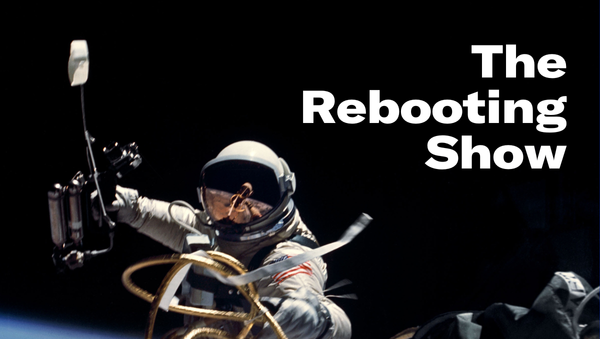The future of search

Welcome to August. For the past month, I have been taunted by an out-of-office message by a lucky Danish reader who has been off for all of July for "ferie." Welcome back, Jan. This is real aspiration.
Today, I wrote about the future of search based off a conversation I had with Troy Young on the latest People vs Algorithms. I don’t think the changes to search have to be so terrible for publishers. Also: The Rebooting is doing a new version of the New Growth Agenda event in November. First a message from our partners at Outbrain, which just got bigger with the $1b acquisition of Teads.

Reimagine your impact
Once an audience's interest is captured, the next challenge is to keep them engaged. Brand Studio’s bespoke interactive experiences rise to this challenge, enhancing the initial draw of Onyx media placements. Through compelling storytelling and interactive elements, they not only maintain but deepen audience engagement, forging a memorable brand experience. Discover the lasting impact of sustained attention. Learn more.
The future of search
Soon, OpenAI will release SearchGPT, its bid to have an AI-fueled twist on the mainstay of the internet. Already, ChatGPT has forced Google to adapt its approach to search with AI Overviews, which return summarized “answers” to queries above the typical search results.
An example of how SearchGPT works shows that it is attempting to modify the search experience rather than create something entirely new. Some of this is likely due to legal concerns. AI crawlers have slurped up web content and at a minimum broken the spirit of the bargain of web crawlers. At worst, they’ve engaged in wholesale theft.
SearchGPT goes out of its way to load its results with links. The main answer area, these are presented as citations. This mimics how Google and Perplexity have approached crediting the sources that have been used to create answers.
The success of SearchGPT is doubtful, at least based on history. I started covering Google before its IPO. I saw it fend off so many rivals. It can afford to make many, many mistakes thanks to its dominant position and being a genericized verb for search.
Apple has been content to outsource search to Google. Amazon threw in the towel on A9. Even Microsoft has struggled to make much of a dent in Google’s lead after a generation of focus and billions in development. Search is such an amazing business model that Bing’s tiny search share (3.5%) is worth an estimated $6.3 billion a year. In search, being a rounding error is a massive business.
Here are the contours of the future of search I’m focusing on:
A bigger search market. Search is a massive market. Google processes an estimated 8.5 billion searches a day. It only shows ads on an estimated 20%. Already the search market is bigger thanks to retail media, much of which is simply search ads on retail sites. Instacart likes to position its ad business as “Adwords for CPG.” At a time of shifting data privacy laws and regulations, intent remains the top signal.
Search is too good of a business model to remain relegated to an all-in-one search engine. LLMs will provide the opportunity to provide differentiated search experiences. Meta is already getting into this game, as search boxes appear within its properties. Twitter never nailed search, but with Grok, X is likely to bring out its own flavor of conversational search. Apple will likely diversify away from cashing the checks from Google, particularly as it raises the ire of regulators as an anti-competitive practice.
This kind of diversification is a positive in a market that’s been a de facto monopoly for so long. Better to be at the mercy of several algorithms than one.
Verticalized search. This expanded search market will be led by verticalized search. Vertical search was a hot market for a period of time in the mid 2000s, but it ended up losing out to Google’s core promise to “organize the world’s information and make it accessible and useful.”
That’s quaint now. Google’s move to lock up access to Reddit is a sign of things to come, reminiscent of early Covid when open borders suddenly went out the window and barriers rose up seemingly overnight. The nightmare scenario is that search evolves like streaming’s unbundling of cable as information is proprietary to different systems. Unless the economics are worked out, I don't see how that isn’t a likely outcome. There simply isn’t a great incentive to provide endless content to these AI engines.
Zero-click economics. Perplexity has struck deals with a handful of publishers to share revenue when their content is used in answers that are monetized by Perplexity’s soon-to-come advertising. The payments are estimated to be “double digit” cuts. This points to more revenue sharing deals in which publishers are in essence in the wholesale business.
The optimistic take is these payments will add up across the many AI crawlers already out there, usually ignoring robots.txt signals to not crawl publisher pages. Publishers have already struck licensing deals with OpenAI and others.
This ends the original search bargain, which allowed Google and other search engines to crawl content and publish snippets in return for sending traffic back to publishers that were monetized with ads, often served via Google’s ad stack, so they got a taste. This shift will be accelerated if Google is forced to spin off its ad tech business, which is not unlikely with its upcoming trial. Without that cut off the monetization from the traffic sent to publishers, Google has far less incentive to send out traffic.
Long-tail compression. Google gives the appearance of being a late-stage empire, as it fumbles the execution of the elimination of the third-party cookie and AI overviews. Conservatives gripe the search results (and even autocompletes) are rigged in some kind of deep state conspiracy. Its recent ham-handed manual updates and war on coupon pages hardly instilled confidence.
And the search experience overall is simply messy. Google is jamming so many things on the page that it is a far cry from the simplicity that fueled its rise. The SERP has become a yard sale.
In the SearchGPT prototype what stood out is that search likely will have fewer winners. The sources judged most authoritative will get a larger share of clicks for critical searches in commerce categories. The reality of licensing deals is that they will largely benefit the biggest publishers rather than mom-and-pop operations that have built their businesses around the Google algorithm. In an answers-and-citations world, a random running blog isn’t going to beat out Runner’s World.
For more discussion of the future of search, listen to the latest episode of People vs Algorithms. It’s available on Apple | Spotify | other podcast platforms.
The New Growth Agenda is returning
In May, The Rebooting held its first New Growth Agenda, an invite-only conversational event that brought together over 40 C-level executives from leading publishers like Dotdash Meredith, Forbes, Hearst, NBCUniversal, Vox Media, The Financial Times, Semafor, Puck and more.
I've done approximately a trillion events over the years. The ones I find most valuable are highly curated, conversational and informal. That's the approach we are taking with NGA. The goal is to foster conversation and connection in order to get the publishing industry focused on growth.
We are bringing NGA back on November 13 at the Tribeca Grill in New York City. The program begins with two hours of interactive high-level conversations that focus on the new growth avenues for publishers. After the programming, we’ll have cocktails and roundtable dinner conversations to dig deeper into specific themes, including:
- The application of AI
- Solving for identity at a time of continued signal loss
- Adopting audience-first strategies
- Building subscriptions and direct revenue streams
Thanks to LiveIntent for being our first sponsor partner for this event. If you’re interested in discussing sponsorship opportunities – we limit the event to four partners – get in touch with me or Elaine Mershon. To apply for an invite, submit your information here.
Thanks for reading in August. My plan is to continue a regular publishing schedule and then take the last two weeks of August off. Send me a note with feedback by hitting reply.




